- Article
- Source: Campus Sanofi
- 18 Jul 2025
Living With ITP

Platelets are only one dimension of ITP1-3
ITP is a complex disease with potential ramifications beyond low platelet counts and the associated bleeding symptoms—including inflammation and its potential effects, and impacts on quality of life (QOL).
Ongoing research continues to support the presence of inflammation in patients with ITP3
Systemic inflammation in ITP is suggested by the presence of elevated inflammatory markers, including4-6:
- TNF-α
- IL-6
- NLRP3 inflammasome
- IFN-γ
ITP affects the whole patient, not just their platelets1,7,8
In the Immune Thrombocytopenia World Impact Survey (I-WISh)* of 1507 patients with ITP and 472 HCPs:

ITP has well-documented effects on patients’ QOL
ITP has well-documented effects on patients’ QOL
ITP symptoms that impact QOL include fatigue, cognitive difficulties, and anxiety.
*I-WISh was an online, cross-sectional survey of patients with ITP and hematologists or hemato-oncologists who treat patients with ITP in 13 countries. The patient questionnaire collected information on demographics and diagnosis, symptoms of ITP, health-related quality of life (HRQOL) and emotion associated with ITP, impact of ITP on work, finances, and support, treatment received, and patient and physician relationship. The physician survey comprised 6 sections that collected information on demographics, diagnosis of ITP and patient caseload, symptoms of ITP, impact of ITP on aspects of patients’ physical, emotional, HRQOL, social health, treatment patterns, and patient and physician relationship. There were 2 questions about the emotional impact of ITP and the responses were based on a 7-point Likert scale (1 = never, 7 = a great deal). There was 1 additional question on the need for professional support.1
Fatigue can be a major burden for patients with ITP9
Sometimes you feel really tired and achy, and it feels just so hard to get through it.
US, patient with ITP
In I-WISh, 1507 patients rated functional, psychological, and emotional aspects of their condition on a 7-point Likert scale, with a score of 5-7 indicating the greatest impact. In the survey1,9:

reported fatigue at diagnosis (n=870/1507).9 Of those,

rated that fatigue as severe (n=637/870)9
But HCPs may not perceive patients’ fatigue at the same levels9
Of the HCPs surveyed in I-WISh:

reported hearing about fatigue at diagnosis (n=472) and rated9

of that fatigue as severe (n=465)9
In the same survey, fatigue did not appear to be correlated with platelet counts.9 |
Patients with ITP might also suffer from cerebral microbleeds (CMBs) and cognitive impairment10,11
In a 2020 study in Blood,†
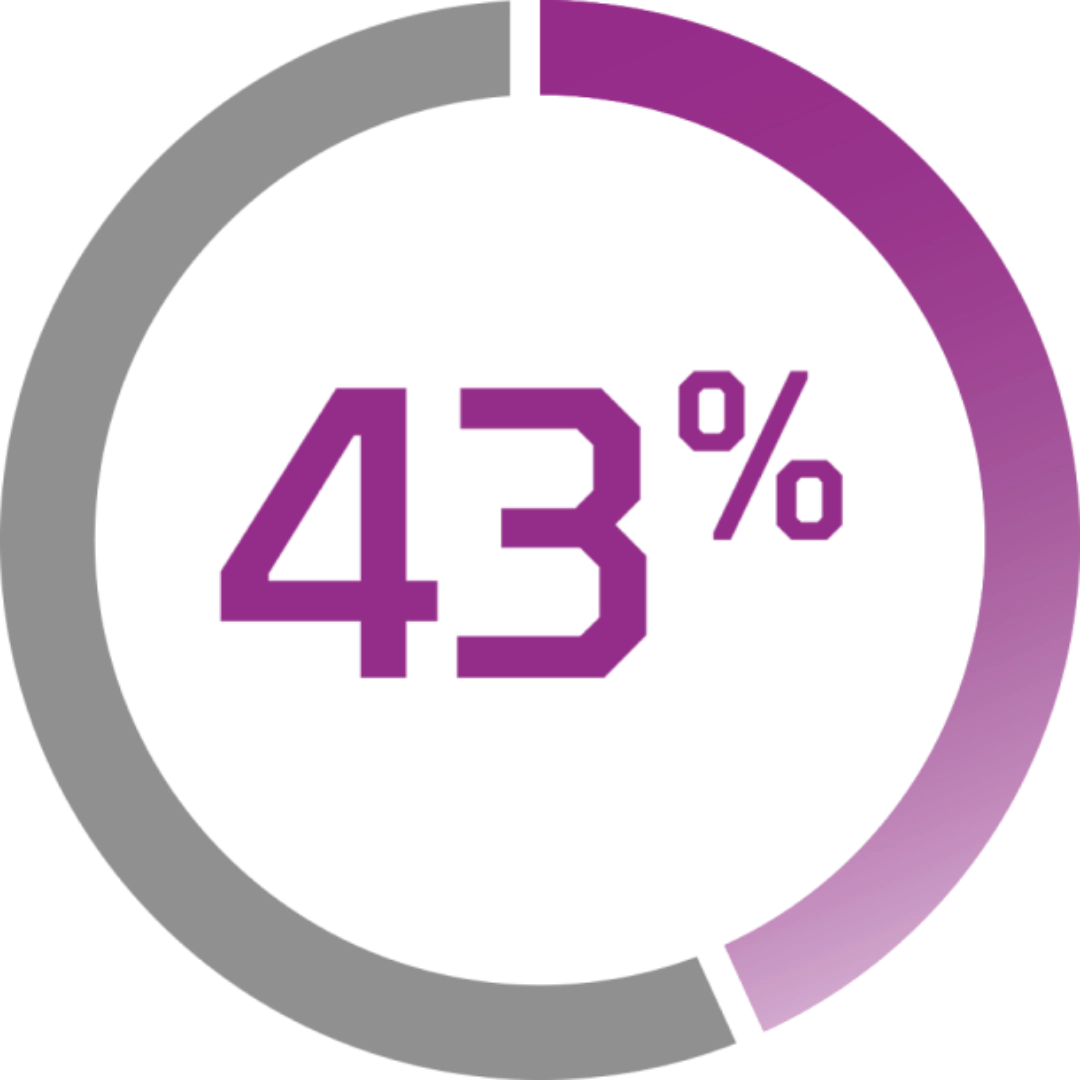
of patients with ITP had CMBs (n=21/49)10
†A cross-sectional prospective study of 49 patients with ITP and nadir platelet counts <30,000/μL and 18 age-matched healthy controls that used susceptibility-weighted magnetic resonance imaging (MRI) to detect CMBs as a marker of occult hemorrhage.10
Based on these preliminary data, CMBs were associated with lower platelet count and longer disease duration. The strong association between CMBs and ITP duration could indicate that CMBs may accumulate over time.10
In a 2022 study in Blood,‡

of patients with ITP experienced some level of cognitive impairment (N=69)11
‡ A total of 69 patients completed the Cambridge Neuropsychological Test Automated Battery (CANTAB) to assess episodic memory, executive function, processing speed, working memory, and attention.11
Many patients with ITP exhibit impairments in attentional function at least as severe as those observed in patients of similar age with mild traumatic brain injury, chronic fatigue syndrome, or moderate-severe depressive disorder.12
Patients are worried about their ITP1
It’s mentally draining to sit in a doctor’s office once or twice a week to have blood work and not know what direction you’re going to go in next.
US, patient with ITP
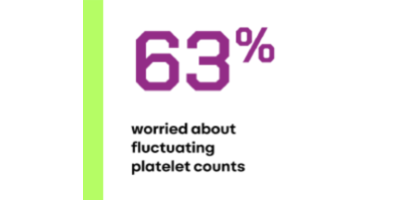
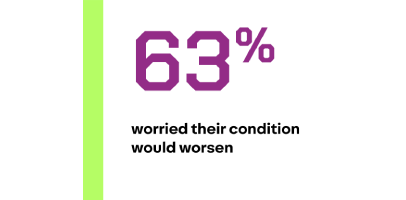
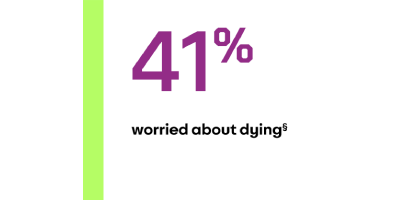
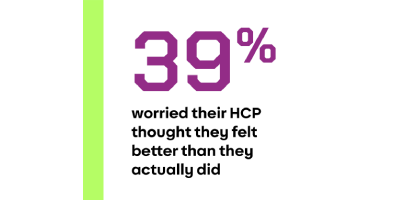
§ A limited number of population-based studies have reported that the rate of death among patients with ITP is comparable to the general population in patients younger than age 60. Mortality is higher than the general population in older patients and patients with comorbidities.13,14
Ask your patients with ITP about fatigue, cognitive impairment, and anxiety. |
Next: Future of ITP
There is an unmet need for ITP treatments that deliver rapid and durable improvements in platelet counts, bleeding symptoms, and patient QOL.15,16
-
Cooper N, Kruse A, Kruse C, et al. Immune thrombocytopenia (ITP) World Impact Survey (I-WISh): Impact of ITP on health-related quality of life. Am J Hematol. 2021;96(2):199-207.
-
Efficace F, Mandelli F, Fazi P, et al. Health-related quality of life and burden of fatigue in patients with primary immune thrombocytopenia by phase of disease. Am J Hematol. 2016;91(10):995-1001.
-
Dal MS, Karakus A, Aydin BB, Ekmen MO, Ulas T, Ayyildiz O. Serum uric acid and inflammation in patients with immune thrombocytopenic purpura: preliminary results. Eur Rev Med Pharmacol Sci. 2015;19(22):4385-4389.
-
Talaat RM, Elmaghraby AM, Barakat SS, El-Shahat M. Alterations in immune cell subsets and their cytokine secretion profile in childhood idiopathic thrombocytopenic purpura (ITP). Clin Exp Immunol. 2014;176(2):291-300.
-
Wang S, Liu Y, Li G, Feng Q, Hou M, Peng J. Reduced intracellular antioxidant capacity in platelets contributes to primary immune thrombocytopenia via ROS-NLRP3-caspase-1 pathway. Thromb Res. 2021;199:1-9.
-
Qiao J, Liu Y, Li X, et al. Elevated expression of NLRP3 in patients with immune thrombocytopenia. Immunol Res. 2016;64(2):431-437.
-
Mitchell E, Frith J, Newton J. Fatigue and cognitive impairment in immune thrombocytopenic purpura remain stable over time: short report from a longitudinal study. Br J Haematol. 2019;186(5):777-781.
-
Terrell DR, Neunert CE, Cooper N, et al. Immune thrombocytopenia (ITP): current limitations in patient management. Medicina (Kaunas). 2020;56(12):667.
-
Cooper N, Kruse A, Kruse C. Immune thrombocytopenia (ITP) World Impact Survey (iWISh): patient and physician perceptions of diagnosis, signs and symptoms, and treatment. Am J Hematol. 2021;96(2):188-198.
-
Cooper N, Morrison MA, Vladescu C, et al. Identification of occult cerebral microbleeds in adults with immune thrombocytopenia. Blood. 2020;136(25):2875-2880.
-
Vladescu C, Hart ACJ, Paul D, et al. Cognitive impairment in patients with immune thrombocytopenia. Blood. 2022;140(suppl 1):5553-5554.
-
Kuter DJ, Khan U, Maruff P, et al. Cognitive impairment among patients with chronic immune thrombocytopenia. Poster presented at: American Society of Hematology Annual Meeting & Exposition; December 10-13, 2022; New Orleans, LA.
-
Frederiksen H, Maegbaek ML, Nørgaard M. Twenty-year mortality of adult patients with primary immune thrombocytopenic purpura: a Danish population-based cohort study. Br J Haematol. 2014;166(2):260-267.
-
Schoonen WM, Kucera G, Coalson J, et al. Epidemiology of immune thrombocytopenic purpura in the General Practice Research Database. Br J Haematol. 2009;145(2):235-244.
-
Audia S, Bonnotte B. Emerging therapies in immune thrombocytopenic purpura. J Clin Med. 2021;10(5):1004-1023.
-
Mingot-Castellano ME, Bastida JM, Caballero-Navarro G, et al. Novel therapies to address unmet needs in ITP. Pharmaceuticals (Basel). 2022;15(7):779.
MAT-BH-2500351-V1-July-25